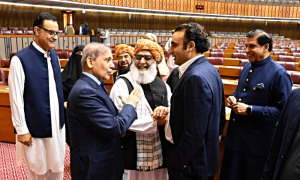ICJ Criticizes “Blow to Judicial Independence” as 26th Constitutional Amendment Becomes Law
- byAdmin
- Oct 22, 2024
- 1 year ago

The International Commission of Jurists (ICJ) has expressed strong disapproval over the passage of the 26th Constitutional Amendment in Pakistan, describing it as a serious setback to judicial independence. The amendment, which was passed by both houses of parliament with a two-thirds majority, introduces significant changes to the judiciary, including curbing the Supreme Court’s suo motu powers and altering the process for appointing the Chief Justice of Pakistan (CJP).
Key Amendments Passed in Parliamentary Session
Pakistan's political landscape witnessed another high-stakes weekend as the ruling coalition successfully pushed through the much-discussed Constitutional Package. On Sunday, the Senate approved the bill, which originally contained 22 clauses, with a two-thirds majority. Following Senate approval, the National Assembly (NA) held an extraordinary session that extended into the early hours of Monday morning, where the bill was passed with a two-thirds majority after incorporating several Senate-proposed changes, increasing the bill’s clauses to 27.
After parliamentary approval, Prime Minister Shehbaz Sharif sent his advice to President Asif Ali Zardari, who subsequently gave his assent, officially enacting the legislation as the “Constitution (26th Amendment) Act, 2024,” according to a notification published in the Gazette.
Major Judicial Reforms Under the 26th Amendment
Under the new law, the power to appoint the Chief Justice of Pakistan has shifted from the judiciary to a Special Parliamentary Committee, which will nominate the CJP from among the three most senior judges of the Supreme Court. The prime minister now plays a decisive role in this process, along with the parliamentary committee.
The amendment also limits the term of the Chief Justice to three years and removes the Supreme Court’s ability to take suo motu action, which previously allowed the court to act independently on matters of public interest.
ICJ Raises Concerns Over Judicial Independence
The ICJ voiced its strong concerns, calling the amendment "a blow to judicial independence, the rule of law, and the protection of human rights." ICJ Secretary General Santiago Canton emphasized that the changes grant an extraordinary level of political influence over judicial appointments and the judiciary’s internal operations.
“The judiciary's ability to act as an independent check on government excesses has been eroded, weakening its capacity to protect human rights,” Canton stated. He added that the rapid and secretive manner in which the bill was passed—within 24 hours and without public consultation—was alarming.
Political Influence in Judicial Processes
One of the ICJ’s primary concerns revolves around changes to the Judicial Commission of Pakistan (JCP). The amendment reshapes the composition of the JCP, reducing the proportion of judicial members and potentially increasing political influence over the commission’s decisions. Additionally, the ICJ criticized the amendment’s provision allowing the JCP to create constitutional benches, which could be used to form politically motivated judicial panels.
The process for appointing the Chief Justice was another point of contention. The ICJ argued that the new parliamentary committee system lacks clear criteria for nominations, raising concerns about transparency and fairness.
The ICJ also flagged concerns about new provisions for the removal of "inefficient" judges. The amendment fails to define what constitutes inefficiency or provide clear criteria, leading to fears that these vague terms could be misused for political purposes.
ICJ: Reform Needed but Approach Problematic
While acknowledging that some reforms might be necessary to improve the efficiency and accountability of the judicial system, the ICJ asserted that these particular amendments threaten the independence of the judiciary. “These changes appear to be an attempt to place the judiciary under executive control, which undermines fundamental principles like the separation of powers and the rule of law,” Canton said.
Government Celebrates Passage of Amendment
Despite the backlash, the government hailed the passing of the 26th Amendment as a significant political and legislative milestone. Prime Minister Shehbaz Sharif congratulated parliament on what he called a "historic achievement," praising the unity of the coalition in securing the required votes.
Interior Minister Mohsin Naqvi echoed this sentiment, praising the pivotal role played by JUI-F leader Maulana Fazlur Rehman, whose influence was critical in garnering support for the amendment.
The government managed to secure 225 votes in the National Assembly, one more than the required 224 for a two-thirds majority. Opposition to the amendment came from 12 members of the Pakistan Tehreek-e-Insaf (PTI) and the Sunni-Ittehad Council (SIC), who staged a walkout during the voting process.
Post a comment
Hot Categories
Recent News
Unlock the Best Travel Discounts: Save Big on Booking.com Packages Today
- Aug 26, 2025
- 3 months ago
ICJ Criticizes “Blow to Judicial Independence” as 26th Constitutional Amendment Becomes Law
- Oct 22, 2024
- 1 year ago
Which skin type are you? This is a guide on skincare for various skin types.
- Jun 28, 2024
- 1 year ago
Daily Newsletter
Get all the top stories from Blogs to keep track.



0 comments